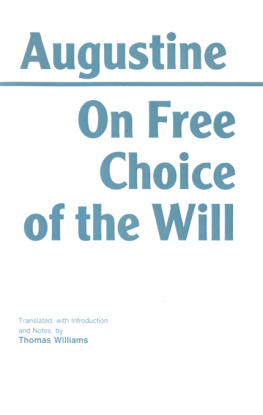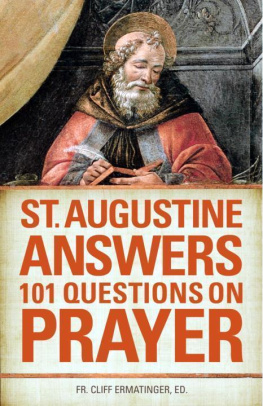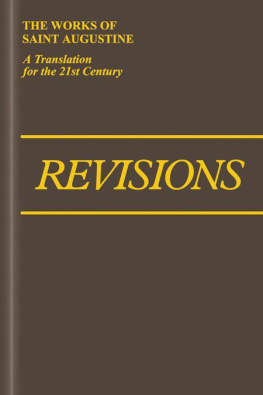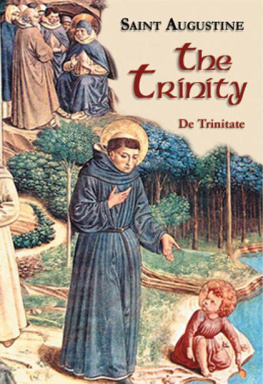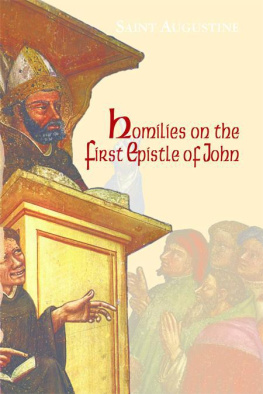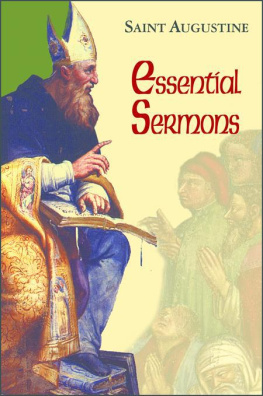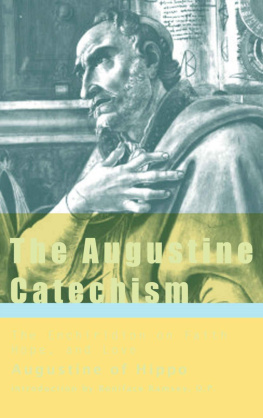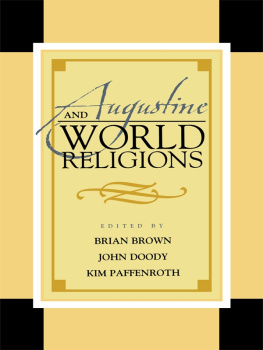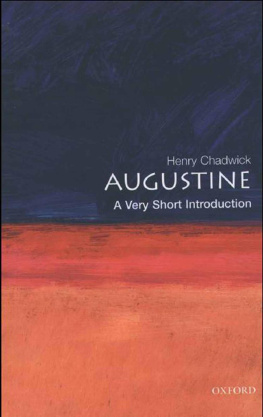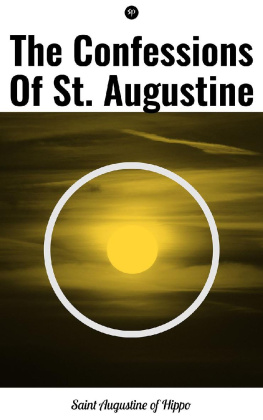Saint Augustine Bishop of Hippo - On Free Choice of the Will
Here you can read online Saint Augustine Bishop of Hippo - On Free Choice of the Will full text of the book (entire story) in english for free. Download pdf and epub, get meaning, cover and reviews about this ebook. year: 1993, publisher: Hackett Pub Co Inc, genre: Religion. Description of the work, (preface) as well as reviews are available. Best literature library LitArk.com created for fans of good reading and offers a wide selection of genres:
Romance novel
Science fiction
Adventure
Detective
Science
History
Home and family
Prose
Art
Politics
Computer
Non-fiction
Religion
Business
Children
Humor
Choose a favorite category and find really read worthwhile books. Enjoy immersion in the world of imagination, feel the emotions of the characters or learn something new for yourself, make an fascinating discovery.
- Book:On Free Choice of the Will
- Author:
- Publisher:Hackett Pub Co Inc
- Genre:
- Year:1993
- Rating:5 / 5
- Favourites:Add to favourites
- Your mark:
- 100
- 1
- 2
- 3
- 4
- 5
On Free Choice of the Will: summary, description and annotation
We offer to read an annotation, description, summary or preface (depends on what the author of the book "On Free Choice of the Will" wrote himself). If you haven't found the necessary information about the book — write in the comments, we will try to find it.
On Free Choice of the Will — read online for free the complete book (whole text) full work
Below is the text of the book, divided by pages. System saving the place of the last page read, allows you to conveniently read the book "On Free Choice of the Will" online for free, without having to search again every time where you left off. Put a bookmark, and you can go to the page where you finished reading at any time.
Font size:
Interval:
Bookmark:
On Free Choice
of the Will
AUGUSTINE
On Free Choice
of the Will
Translated by
Thomas Williams
Hackett Publishing Company
Indianapolis / Cambridge
Augustine: 354430
Copyright 1993 by Hackett Publishing Company, Inc.
All rights reserved
Printed in the United States of America
14 13 12 11 10 6 7 8 9 10
Cover design by Listenberger & Associates
Interior design by Dan Kirklin
For further information please address
Hackett Publishing Company, Inc.
P.O. Box 44937
Indianapolis, Indiana 46244-0937
Library of Congress Cataloging-in-Publication Data
Augustine, Saint, Bishop of Hippo.
[De libero arbitrio. English]
On free choice of the will/Augustine; translated, with introduction and notes, by Thomas Williams.
p. cm.
Includes bibliographical references.
ISBN 0-87220-189-9 (cloth) ISBN 0-87220-188-0 (pbk.)
1. Free will and determinismEarly works to 1800. 2. GodOmnipotenceEarly works to 1800. I. Williams, Thomas, 1967II. Title.
BR65.A664E5 1993
233.7dc20 93-22170
CIP
ePub ISBN: 978-1-60384-630-1
For My Parents
My aim in this translation has been to reproduce as faithfully as possible Augustines meaning, emphasis, and sequence of thought. I have made no attempt to reproduce the polysyllabic splendor of Augustines Latin; such weighty rhetoric is too much for the slender skeleton of contemporary English to bear. This decision has frequently meant sacrificing some of Augustines favorite rhetorical devices: for example, his habit of expressing arguments in the negative, and often in interrogative form; his tendency to apologize for metaphors by inserting an expression like as it were or in a certain sense; and his repetitions for rhetorical effect. In choosing between a literal but turgid translation and a freer but crisper one, I have preferred the latter, provided always that the meaning and emphasis are preserved.
I have adopted gender-inclusive language only where it could be used without calling attention to itself. It would be the worst of anachronisms to make Augustine sound as if he had the same concerns about inclusiveness that we have nowadays. In general, I have preferred human being to man in the generic sense. Where appropriate, I have also changed singular subjects to plural in order to allow the use of common-gender pronouns. Otherwise my usage is that of traditional English, in which the masculine bias is actually less pronounced than it is in Latin.
References to Scripture are given in accordance with the verse and chapter divisions of the New Revised Standard Version of the Bible.
For the Latin text of On Free Choice of the Will I used the critical edition in the Corpus Christianorum: Series Latina, volume 29, edited by W. M. Green (Turnhout, Belgium: Brepols, 1970). Except for its surprisingly frequent typographical errors, this edition is the same as the one that appeared earlier in the Corpus Scriptorum Ecclesiasticorum Latinorum. I have adopted variant readings in two places: at page 256, line 22, for iuste videndum est read iuste vivendum est; and at page 276, line 6, for bonum hominem read primum hominem. In addition, at page 308, line 47, I have emended esse to esset.
For the Latin text of the Reconsiderations I used the critical edition from the same series, volume 57, edited by Almut Mutzenbecher (1984). It should be noted that the quotations that appear in the Reconsiderations do not always correspond word for word with the text that appears in On Free Choice of the Will.
I wish to thank Professor Alfred J. Freddoso of the University of Notre Dame, without whose encouragement I would not have undertaken this translation. And I am especially grateful to Professor Paul Spade of Indiana University, who read the entire translation with painstaking care and great insight. To him I owe the elimination of any number of errors and infelicities, and many helpful suggestions for improvement.
Despite its relative brevity, On Free Choice of the Will contains almost every distinctive feature of Augustines philosophy. It presents the essentials of his ethics, his theory of knowledge, and his views of God and human nature. It is therefore the ideal introduction to Augustines thought for introductory courses and surveys of medieval philosophy, where there is not time for a complete and detailed reading of longer works such as the Confessions and The City of God. But its very richness makes it impossible for me to discuss in this brief introduction even all of the more important aspects of this work. In what follows, therefore, I concern myself chiefly with the two concepts that figure in the title: freedom and the will.
The word freedom has many senses. One sort of freedom involves the absence of restraints. As long as the door is not locked, I am free (in this sense) to leave the room. We might call this physical freedom. Physical freedom means that there is nothing to hinder me from acting as I choose to act.
But suppose I live in a deterministic universe. Every choice I make is determined by prior states of the universe, states over which I have no control. I may still be physically freeno one has locked me up or tied me downbut it seems that I lack freedom in some stronger and more interesting sense. I am free to act as I choose, but my choices themselves are not free. The freedom to choose in a way that is not determined by anything outside my control is what I shall call metaphysical freedom.
The view that human beings have metaphysical freedom is called libertarianism. Libertarianism is no longer a popular view among philosophers, most of whom think that at best we have only physical freedom. But Augustine was one of the great defenders of libertarianism; indeed, he was the first to articulate the view clearly. According to Augustine, human beings are endowed with a power that he calls the will. Augustine compares the will to the weight of an inanimate object. Just as a falling apple is carried to the ground by its weight, so a human being is carried to his goal (whatever that may be) by his will. But the analogy is deficient in one important respect. The falling apple has no say about where its weight will take it. A human being, however, can use his will to go in a seemingly limitless variety of directions. This feature of the will Augustine calls liberum arbitrium, which can be translated as freedom of decision or (more usually) free choice. Because it has free choice, the will, truly the captain of its soul, looks out over the vast sea of good things and sails wherever it pleases, blithely unaffected by the winds and waves of cause and effect that steer unthinking and unfree vessels. Thus, the will is not determined by any external factors. Only the will can determine itself to choose. This freedom is what allows us to be responsible for our actions; if outside forces beyond our control caused us to choose to act in a certain way, we could hardly be held responsible for acting in that way.
Thus far I have talked about being determined by external things. Some philosophers would object to this as an unfair characterization of their views. We agree, they might say, that if our choices are caused by external forces, then they are not our responsibility. But it is not external states that determine our choices; it is internal states: beliefs, desires, states of character, and so on. And since it is my desires and my character that determine my choices, my freedom is not threatened.
A libertarian like Augustine would not be convinced by this sort of reasoning. These philosophers still insist that my choices are determined; the fact that they are determined by internal rather than external factors is inconsequential. It is no better to be a hand puppet than a marionette. Besides, to a libertarian, this view is just a dodge. To see why this is the case, suppose that I have made some choice that was determined by my state of character at the time of the choice. Call that state of character
Next pageFont size:
Interval:
Bookmark:
Similar books «On Free Choice of the Will»
Look at similar books to On Free Choice of the Will. We have selected literature similar in name and meaning in the hope of providing readers with more options to find new, interesting, not yet read works.
Discussion, reviews of the book On Free Choice of the Will and just readers' own opinions. Leave your comments, write what you think about the work, its meaning or the main characters. Specify what exactly you liked and what you didn't like, and why you think so.

